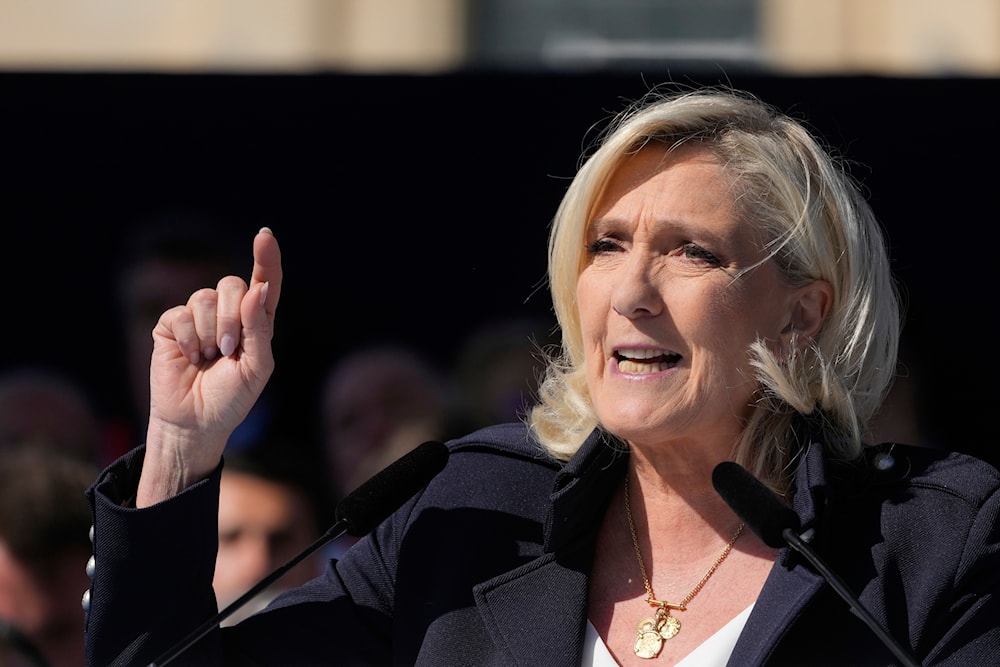Legal troubles worsen for Le Pen as French far-right struggles: FT
Marine Le Pen faces mounting legal scrutiny amid new allegations of illegal campaign financing, threatening her 2027 presidential bid.
-

French far-right leader Marine Le Pen delivers her speech during a rally near the parliament in Paris, France, on April 6, 2025. (AP)
Marine Le Pen’s far-right Rassemblement National (RN) party is facing renewed legal pressure following police raids on its headquarters and the office of Le Pen herself, amid allegations of illegal campaign financing.
The probe comes just months after Le Pen was convicted of embezzling European Union (EU) funds, resulting in a five-year ban from seeking elected office—effectively sidelining her from France’s 2027 presidential race. The allegations, detailed by the Financial Times (FT), involve claims that RN circumvented donation limits by soliciting “patriotic loans” from supporters. Prosecutors are now investigating whether these loans were, in fact, concealed political donations.
The timing of this investigation has triggered accusations from RN officials of political targeting. Jordan Bardella, Le Pen’s protégé and the party’s president, told BFMTV the raids were “a political operation” designed to “destroy” the party financially and disqualify it electorally. Bardella insists that France’s campaign watchdog had previously approved all campaign accounts through 2023.
Le Pen, who continues to proclaim her innocence and is appealing the earlier conviction, struck a notably somber tone in a recent interview. When asked by Valeurs actuelles about the overlap in presidential ambitions between her and Bardella, she replied, “Of course, the situation is not ideal... But what would you have me do? Kill myself before being assassinated?”
The illusion of momentum
Just over a year ago, Le Pen’s RN appeared poised to capture the premiership following strong polling ahead of France’s snap legislative elections. However, the party underperformed after a poorly run campaign and a united front from centrist and leftist coalitions. While the RN still maintains the support of about one-third of the French electorate, recent setbacks have raised questions about whether its support ceiling has already been reached.
Despite the legal troubles, senior party figures deny being in crisis. MEP Philippe Olivier, Le Pen’s brother-in-law, dismissed the concerns to the FT.
“Do not think that we are in crisis. All these legal cases show the establishment is panicking that we will take power,” Olivier said.
He added that Le Pen considers legal battles to be part of the broader political struggle.
Read more: Le Pen slams conviction as 'political decision', vows to fight
Strategic dilemmas for Le Pen
The RN’s financial model has also come under scrutiny. French banks have long refused to lend to the party, prompting RN to ask supporters for loans under “patriotic lending” schemes. While these are technically legal under French law, investigators are exploring whether some were never repaid, potentially violating strict limits on political donations.
For Le Pen, the most immediate political threat comes not from legal action alone, but from within her own party. With her presidential ambitions now in limbo, Bardella has emerged as a charismatic and highly favored leader. Recent polls show him surpassing Le Pen in popularity, raising questions over whether he will remain content in a secondary role.
While both insist publicly that their partnership remains strong, divisions are quietly forming between “Marinistes” loyal to Le Pen and those backing Bardella.
“The Le Pen family no longer has a complete grip on the party,” Luc Rouban, a political scientist at Sciences Po, told the FT.
Read more: Marine Le Pen accuses EU of advancing planned war project in the East
Macron’s fragile government, RN’s leverage
The RN’s influence in French politics remains substantial. It is now the largest single party in the National Assembly, with 123 seats following the 2024 elections. French President Emmanuel Macron, meanwhile, has struggled to form a stable government and is relying on RN votes to avoid collapse. His current Prime Minister, Francois Bayrou, faces a crucial no-confidence vote this fall over a deeply unpopular budget.
Bringing down the government could lead to early parliamentary elections—but due to Le Pen's legal conviction, she would be unable to stand for re-election, potentially losing her own seat in the process. On the other hand, backing austerity policies would alienate her base.
“She has set red lines on tax and spending which Bayrou cannot easily observe,” said Mujtaba Rahman of the Eurasia Group, “and she would anger her party and her electoral base if she backs down.”
Read more: US aide proposed funding Le Pen's legal fight, sparking uproar
RN: A party in flux
Despite a decade of rebranding efforts, RN remains stuck between institutional rejection and extremist roots. Meanwhile, Le Pen’s legal troubles and Bardella’s ascent signal a party in transition, if not turmoil. While RN still commands significant electoral support and legislative power, its ability to transform that into national leadership remains uncertain—especially as French institutions continue to act as a check on far-right ambitions.
Read more: Le Pen urges French right-wing to be ready for possible snap elections

 5 Min Read
5 Min Read










